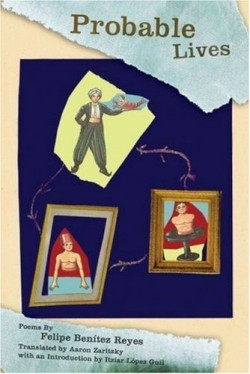Probable Lives
This goofy book will please literati and iconoclasts alike, and should engage a sustained interest as well among those who merely like to read good poetry. In it, a fictional biographer presents a series of fictional twentieth-century poets with biographies and examples of the work of each. Requiring particular skill and succeeding with particular brilliance are poems in which the reader has an opportunity to compare the work and style with real, well-known poets.
Although an introduction by the translator suggests that the poet’s intention was to set up an amusing little international game show, in the first section, supposedly written by a real American poet during his sojourn in Spain, are simply good poems in both languages.
This endeavor seems almost doomed to be slapstick. Instead, supported by an admirable talent, it turns out to be high irony—for example the brief saga of “The Lofty Hendecasyllabist Servando Montes*.*” The hendecasyllabic line a line of eleven syllables) is the standard line-count for classical Spanish poetry.
According to this poet’s “biography,” since his ambition was to write poems in which every line was as lofty as it was memorable, his oeuvre only reached the summit of a poem of two and a half hendecasyllabic lines. Although married to a decent and simple woman, his heart was stolen by the demimondaine Dorita Villalba, “a woman of no little elegance and not much decency … elements … famous for the haste with which they drive men to ruin, bitterness, the texts of Kierkegaard, and a dissolute life.” Ruined and abandoned, he makes a final offering that echoes the courageous utterance of a soul in torment still singing the litany of that lost love: “Cuando caiga la muerte sobre mi, / Dora Villalba … When death falls over me, / Dora Villalba …)”
This is the first English translation of the 1996 original, which won the National Book Award and the National Critics’ Award in Spain and has been praised as a gem of post-modernism, in which the author makes himself invisible, in this case by disappearing completely in a parade of dramatis personae having nothing to do with his own style or preference in poetic styles. Reyes’s previous works include poetry collections like Escaparate de venenos The Poison Display) and El equipaje abierto Open Luggage) as well as a novel, Humo Smoke).
Those who enjoy wandering the labyrinthine complexities of literary exegesis will enjoy this volume’s “Afterword” by Itzíar López Guil, with its reference to studies of equal profundity. His assurance that the “poets” presented in this volume are indeed fictional will save readers the trouble of looking them up on the Internet in vain. The poets whom some of these characters attempt to plagiarize Emily Dickinson, Keats, T. S. Eliot—plus one Classical Spaniard) are, on the other hand, real enough for a comparison study.
Reviewed by
Sandy McKinney
Disclosure: This article is not an endorsement, but a review. The publisher of this book provided free copies of the book to have their book reviewed by a professional reviewer. No fee was paid by the publisher for this review. Foreword Reviews only recommends books that we love. Foreword Magazine, Inc. is disclosing this in accordance with the Federal Trade Commission’s 16 CFR, Part 255.

